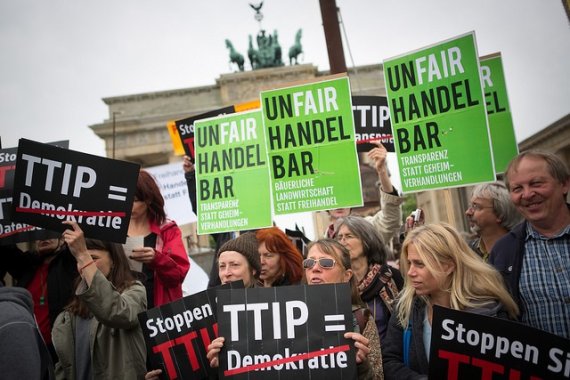The negotiations about TTIP are controversial. Photo: Christian Mang
Negotiations have been going on behind closed doors for several years about a far-reaching free trade agreement between the US and the EU, known as TTIP. This treaty is intended to ensure more mutual trade and investment by getting rid of trade restrictions and harmonizing regulations. The treaty covers the entire economy including the agricultural sector.
The LEI report predicts that a trade agreement would work out positively for Dutch agricultural exports. The dairy and food processing industries, which are highly competitive, stand to gain in particular. Nevertheless, the Dutch share in world trade would be dented by an agreement because other countries would benefit more from it. The Dutch meat sector is likely to suffer especially badly from the increased competition, thinks the LEI. The exact consequences for pig and poultry farmers are difficult to predict now, says main author Siemen van Berkum. ‘But it may well lead to further upscaling and rationalization.’
The USA and EU have totally different ideas about how you manage risks
Siemen van Berkum
The impact of TTIP depends on the final text. A ‘light’ agreement which only scraps quotas and import taxes would not have much influence on trade. Harmonizing rules and regulations such as those regarding food safety would have much more impact. It does not seem very likely, however, that agreement will be reached on these kinds of issues, says Van Berkum. ‘The parties have totally different ideas about how you manage risks.’ He thinks it is unlikely, for instance, that Europe will lift the ban on American beef from cows treated with growth hormones.
Be that as it may, a deal is by no means certain. The negotiations could be derailed for political reasons. For a long time France was not playing ball because it wanted to protect the cultural sector. There has also been a lot of criticism of the secret nature of the TTIP negotiations. Critics think unelected negotiators should not be allowed to have so much influence on legislation. The LEI report was funded by the ministry of Economic Affairs.

